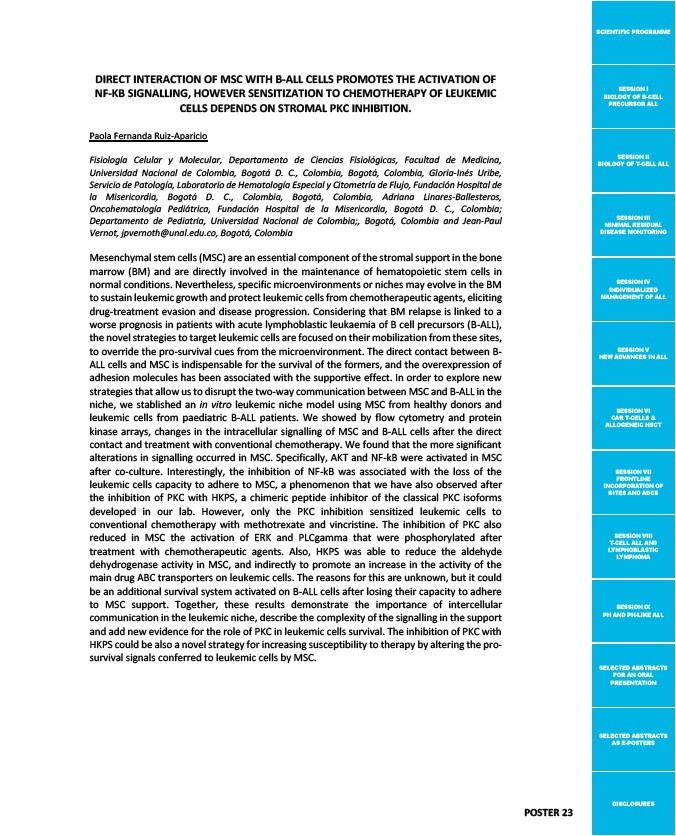
SCIENTIFIC PROGRAMME
SESSION I
BIOLOGY OF B-CELL
PRECURSOR ALL
SESSION II
BIOLOGY OF T-CELL ALL
SESSION III
MINIMAL RESIDUAL
DISEASE MONITORING
SESSION IV
INDIVIDUALIZED
MANAGEMENT OF ALL
SESSION V
NEW ADVANCES IN ALL
SESSION VI
CAR T-CELLS &
ALLOGENEIC HSCT
SESSION VII
FRONTLINE
INCORPORATION OF
BITES AND ADCS
SESSION VIII
T-CELL ALL AND
LYMPHOBLASTIC
LYMPHOMA
SESSION IX
PH AND PH-LIKE ALL
SELECTED ABSTRACTS
FOR AN ORAL
PRESENTATION
SELECTED ABSTRACTS
AS E-POSTERS
DISCLOSURES
DIRECT INTERACTION OF MSC WITH B-ALL CELLS PROMOTES THE ACTIVATION OF
NF-KB SIGNALLING, HOWEVER SENSITIZATION TO CHEMOTHERAPY OF LEUKEMIC
CELLS DEPENDS ON STROMAL PKC INHIBITION.
Paola Fernanda Ruiz-Aparicio
Fisiología Celular y Molecular, Departamento de Ciencias Fisiológicas, Facultad de Medicina,
Universidad Nacional de Colombia, Bogotá D. C., Colombia, Bogotá, Colombia, Gloria-Inés Uribe,
Servicio de Patología, Laboratorio de Hematología Especial y Citometría de Flujo, Fundación Hospital de
la Misericordia, Bogotá D. C., Colombia, Bogotá, Colombia, Adriana Linares-Ballesteros,
Oncohematología Pediátrica, Fundación Hospital de la Misericordia, Bogotá D. C., Colombia;
Departamento de Pediatría, Universidad Nacional de Colombia;, Bogotá, Colombia and Jean-Paul
Vernot, jpvernoth@unal.edu.co, Bogotá, Colombia
Mesenchymal stem cells (MSC) are an essential component of the stromal support in the bone
marrow (BM) and are directly involved in the maintenance of hematopoietic stem cells in
normal conditions. Nevertheless, specific microenvironments or niches may evolve in the BM
to sustain leukemic growth and protect leukemic cells from chemotherapeutic agents, eliciting
drug-treatment evasion and disease progression. Considering that BM relapse is linked to a
worse prognosis in patients with acute lymphoblastic leukaemia of B cell precursors (B-ALL),
the novel strategies to target leukemic cells are focused on their mobilization from these sites,
to override the pro-survival cues from the microenvironment. The direct contact between B-ALL
cells and MSC is indispensable for the survival of the formers, and the overexpression of
adhesion molecules has been associated with the supportive effect. In order to explore new
strategies that allow us to disrupt the two-way communication between MSC and B-ALL in the
niche, we stablished an in vitro leukemic niche model using MSC from healthy donors and
leukemic cells from paediatric B-ALL patients. We showed by flow cytometry and protein
kinase arrays, changes in the intracellular signalling of MSC and B-ALL cells after the direct
contact and treatment with conventional chemotherapy. We found that the more significant
alterations in signalling occurred in MSC. Specifically, AKT and NF-kB were activated in MSC
after co-culture. Interestingly, the inhibition of NF-kB was associated with the loss of the
leukemic cells capacity to adhere to MSC, a phenomenon that we have also observed after
the inhibition of PKC with HKPS, a chimeric peptide inhibitor of the classical PKC isoforms
developed in our lab. However, only the PKC inhibition sensitized leukemic cells to
conventional chemotherapy with methotrexate and vincristine. The inhibition of PKC also
reduced in MSC the activation of ERK and PLCgamma that were phosphorylated after
treatment with chemotherapeutic agents. Also, HKPS was able to reduce the aldehyde
dehydrogenase activity in MSC, and indirectly to promote an increase in the activity of the
main drug ABC transporters on leukemic cells. The reasons for this are unknown, but it could
be an additional survival system activated on B-ALL cells after losing their capacity to adhere
to MSC support. Together, these results demonstrate the importance of intercellular
communication in the leukemic niche, describe the complexity of the signalling in the support
and add new evidence for the role of PKC in leukemic cells survival. The inhibition of PKC with
HKPS could be also a novel strategy for increasing susceptibility to therapy by altering the pro-survival
signals conferred to leukemic cells by MSC.
POSTER 23